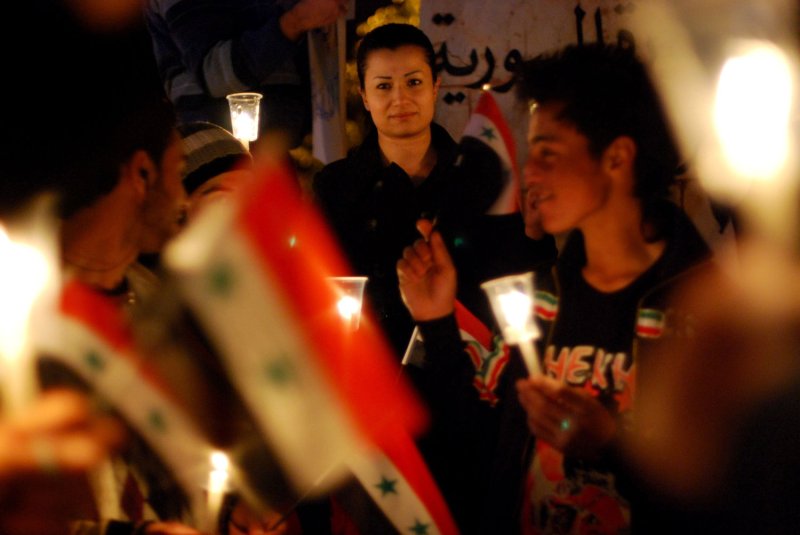1 of 3 | Anti-government protesters hold the Syrian flags and candles at Shuhada or (Martyrs) Square in Swaeda in the southern part of Syria on March 28, 2011. UPI/Ali Bitar |
License Photo
DARAA, Syria, April 25 (UPI) -- President Obama is pursuing a number of possible policy options, such as targeted sanctions, to respond to the crackdown in Syria, the White House said Monday.
"The Syrian people have called for the freedoms that all individuals around the world should enjoy -- freedom of expression, association, peaceful assembly, and the ability to freely choose their leaders," White House spokesman Jay Carney said during a media briefing. "The president said -- and I say here -- that we strongly oppose the Syrian government's treatment of its citizens, and we continue to do that."
In Daraa, witnesses said up to 6,000 soldiers and eight tanks moved into the city considered ground zero of Syria's protest movement Monday. At least 25 people were killed.
The government of President Bashar Assad also sent troops into towns around Damascus where large-scale demonstrations were conducted during the past five weeks, activists told The New York Times.
In Washington, Carney said Syria already is under sanctions by the United States, "but we're looking at other means to increase the pressure on the regime and the Syrian government in a targeted way."
Without indicating what the possible sanctions were, Carney said any action would "make clear that this behavior is unacceptable."
Carney said it was up to the Syrian people to determine whether Assad has shattered their confidence.
"[It] is up to the people of Syria to decide who its leaders should be. That's what we believe," he said. "And the Syrian people should certainly be respected -- their rights should be respected. They should not be attacked; they should not be killed as they express their grievances to the Syrian government."
One witness, identified as Abdullah, described a grisly scene to the Times.
"There are bodies in the streets we can't reach; anyone who walks outside is getting shot at," he said. "They want to teach Syria a lesson by teaching Daraa a lesson."
With foreign reporters barred from the country, word on the government actions came from telephone interviews and videos posted to Web sites. The government appeared to be successful in cutting off most communications.
Protesters said between 4,000 and 6,000 soldiers entered Daraa from all sides at dawn.
The witness Abdullah told the Times the government seized three mosques, although the Omari Mosque, which has become something of a headquarters for rebels, remained free.
Another witness told CNN solders entered people's houses and were "firing randomly at houses. We were sleeping and not protesting."
Witnesses said the security forces surrounded towns outside of the capital Sunday, searching people as they entered or left in an apparent attempt to bar protesters from marching on the capital to protest Assad's decades-long rule.
The Syrian government and security forces generally have been speaking only through state media, CNN reported. Syrian leadership did not immediately comment on reports from Daraa Monday.
Protests erupted in Daraa in March after security forces arrested a group of high school students accused of writing anti-government graffiti on a wall.
Across the country, security forces and armed militia already have killed hundreds of protesters, including more than 109 people in 14 communities on Friday alone. Scores of people have been reported missing since Friday.
"There is going to be much more bloodshed," said Wissam Tarif, head of Insan, a Syrian human rights group, "All the signals from my perspective indicate that."
The crackdown came after the government lifted its emergency rule, in place since 1963.
Navi Pillay, the U.N. high commissioner for human rights, denounced the mounting violence and called upon Syrian officials to release detained activists and political prisoners, The Guardian reported.
The bloodshed and alleged human rights violations prompted world leaders, including Obama, to condemn Assad, whose family has ruled Syria for more than 40 years. Russia and Turkey, usually allies of Damascus, also voiced concern.















